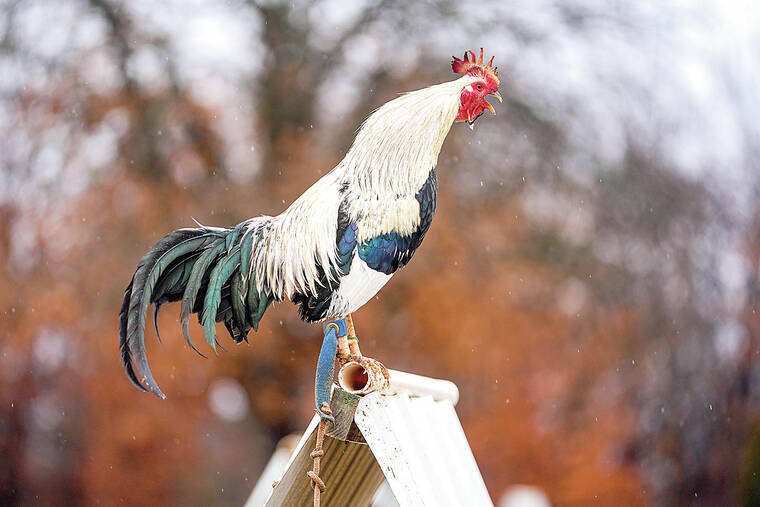A controversial state measure that would crack down on people raising chickens for cockfighting is dead.
While cockfighting already is illegal in Hawaii, House Bill 1980 would increase the severity of the offense from a misdemeanor to a Class C felony punishable by up to five years in prison or a fine of up to $10,000.
Specifically, the bill established the offense of “cruelty to animals by fighting birds.”
Anyone found arranging or holding a “fight between birds,” training or raising birds to fight, or allowing a child to be present at any such bird fight would be charged with first-degree cruelty to animals by fighting birds.
The latest version of the measure also stated that any such offense involving five or more birds would be elevated to a Class B felony, which holds a maximum possible sentence of 10 years in prison or fines of up to $25,000. Anyone convicted of this offense also would be prohibited from owning any birds for at least five years.
A lower level offense, second-degree cruelty to animals by fighting birds, was also detailed in the measure. That charge would apply to anyone who knowingly attends or gambles on any fight between birds, or possesses “any device intended to enhance a bird’s fighting ability,” such as a blade designed to be attached to the bird’s spurs.
The second-degree offense would be a petty misdemeanor, although it would be elevated to a Class-C felony if someone was convicted of it three times within five years.
While the bill generated a significant amount of support on the grounds of its likelihood of curbing violence against animals, it received roughly equivalent pushback both from rural residents defending the cultural significance of raising gamefowl, and poultry farmers worried about being caught in the same dragnet.
It was because of those latter fears that the bill died last week during the state Senate’s third reading of the bill. Senate Minority Leader and Ewa Beach Sen. Kurt Fevella said during the hearing he feared the measure would needlessly criminalize law-abiding citizens.
“When it comes to raising and breeding chickens for whatever reason you use it for, I understand if you are caught in the act of chicken fighting or cockfighting … it’s on you, because that is an illegal activity,” Fevella said on the Senate floor. “But now you are jeopardizing the feed stores, the mom-and-pop stores, that sell feed and vitamins and all these other things people feed the birds for whatever reason.”
Fevella said the amount of chickenfeed, eggs and other products sold in the state depends on fowl breeders who could be unfairly charged with animal cruelty just for transporting gamefowl.
Kohala Sen. Tim Richards agreed, telling the Tribune-Herald on Friday that he is wary of any bill that seems to adjudicate one issue by using overly broad language that could apply to another.
“My concern is that it would suck animal agricultural into the same issue,” Richards said, explaining that the bill didn’t properly set definitions for terms such as gamefowl or “fighting birds.”
While Richards acknowledged that poultry farmers could likely defend themselves in court from charges leveled through Bill 1980, “animal ag doesn’t need to go to court.”
“I hear what they’re saying about animal cruelty,” Richards said. “But we keep talking as a state about food security, and we need protein.”
The Senate ultimately voted 14-19 on April 9 against the bill.
With the bill failed, and its companion Senate measure dead in the water since February, the matter is likely dead this legislative session.
Email Michael Brestovansky at mbrestovansky@hawaiitribune-herald.com.



